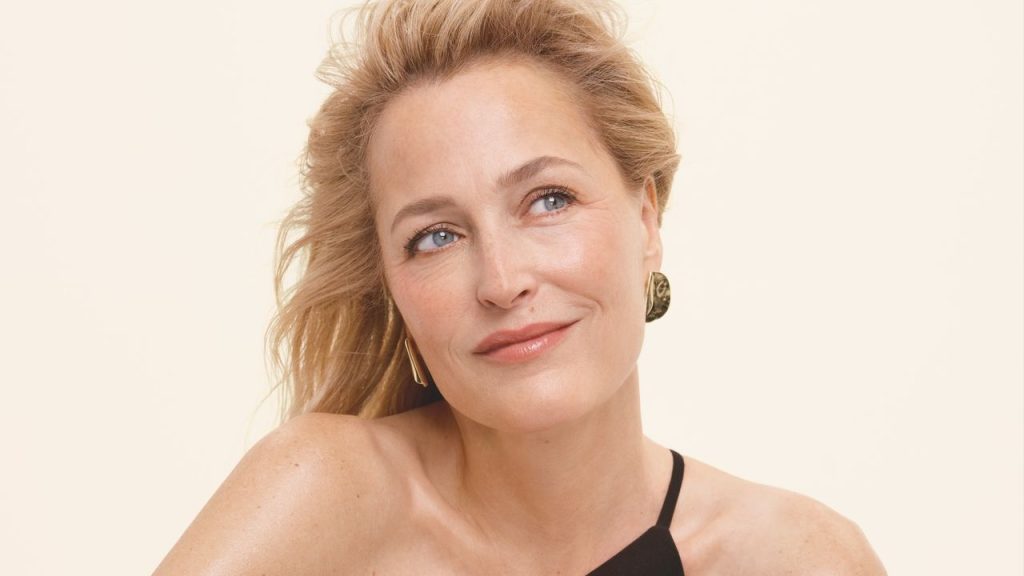As the lift at Claridge’s glides smoothly upward, I can feel a mix of excitement and anticipation buzzing in the air. I’m about to meet Gillian Anderson, the acclaimed actress who has recently taken on the role of spokesperson for L’Oréal Paris’ Age Perfect range. Dressed elegantly in cream from head to toe, Anderson greets me with an inviting smile that instantly puts me at ease. Having just seen her compelling performance as Margaret Thatcher in “The Crown,” her warm demeanor is a striking contrast, marking a shift from the high-stakes political drama to a more relatable conversation about beauty, aging, and self-acceptance. However, the clock is ticking; Anderson has a busy schedule, so we dive straight into the conversation.
As the face of skincare products designed specifically for mature skin, there’s a natural curiosity about how she navigates the subject of aging in the limelight. With refreshing honesty, Anderson states, “I don’t think about it.” This candid approach reveals her focus on authenticity, emphasizing that the way she presents herself to the world should align with her real-life appearance. This earnestness mirrors her ethos about beauty and identity: “It’s important that how I look in real life is the way I present myself to the world.” For her, the portrayal of beauty isn’t limited to red carpet appearances debuffed with makeup but extends to showcasing a more genuine version of oneself.
Intrigued by her perspective, I ask whether her commitment to presenting her true self in social media is a conscious choice. Anderson’s answer is unequivocal: she made a deliberate decision to join social media on her own terms. She wants to mirror her personal values in the digital landscape, advocating for authenticity over artifice. This striving for truth resonates deeply in a world increasingly saturated with curated images and filtered realities. “I knew that I had to do it on my own terms,” she explains, reinforcing her desire to represent every facet of womanhood—not just the glossy, perfected versions that often dominate media narratives.
Anderson’s reflections on aging and representation highlight a larger conversation about the expectations placed on women, particularly in Hollywood. The pressure to conform to youthful ideals can be overwhelming, leading many to feel they must chase an unattainable standard. Yet, through her association with L’Oréal’s Age Perfect line, she encourages women to embrace their age and the natural changes that come with it. This message aligns perfectly with the brand’s mission to empower women over 50 to feel beautiful and confident. Rather than retaliating against aging, Anderson suggests that it can be celebrated, and she embodies this philosophy in both her personal and professional lives.
What stands out in our conversation is her passionate conviction that women should be represented in all their variations—flaws, age, and all. It’s a refreshing shift from the superficial beauty ideals often portrayed in the media, which can be both exclusionary and unrealistic. “I think it’s important that women see every version of ourselves represented,” she asserts, emphasizing the necessity for diverse portrayals that resonate with authentic experiences. This advocacy for unfiltered representation not only empowers women but also cultivates a more inclusive narrative about beauty, one that embraces age rather than shying away from it.
As our conversation draws to a close, I am left with a sense of admiration for Anderson’s unyielding commitment to authenticity. Her words resonate long past our interaction, a reminder that beauty is not just a superficial quality but a holistic expression of self. By stepping into this new role with L’Oréal, Anderson not only promotes a line of skincare but also champions an empowering message for women everywhere—to embrace their age and authenticity, to celebrate every chapter of their lives, and to redefine what it means to be beautiful in a world that is so often fixated on perfection.

